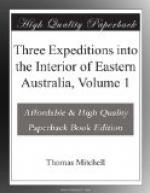(Footnote. See the Journal of my next Journey Chapter 2.8.)
WATER SCARCE.
I was still disposed to pursue a middle direction between the mountains and the river (35 degrees West of North) but I bore in mind the necessity for turning these ranges, so as to pass into that part of the country beyond them at which we should have arrived if we had crossed them where we first attempted, in order to determine the question as to the existence of the large river there, as stated by The Barber.
PROVIDENTIAL SUPPLY.
A rather elevated but grassy plain afforded little prospect of water being near at the time we were about to halt and rest, after a long journey, and I had directed the men to pitch the tents, despairing of reaching water that day, when I suddenly came upon a deep pool. I was truly sensible of the goodness of Providence, considering that this was to all appearance the only water within many miles, and on a plain where I had no reason to expect it. I could not then see how the pond was supplied.
CRAYFISH.
Neither was this all our good fortune, for having directed Jones (one of the men ablest at fishing) to try the pond, to the no small amusement of the others; he nevertheless drew out in a short time a good dish of crayfish (or lobsters, as they termed them). We had also killed a kangaroo that morning, which enabled us to feed our famished dogs, so that our entry on this new region could not have been more auspicious.
TRAP-HILL ON PLAINS.
In the afternoon I walked to the isolated hill of the plain, and found that it consisted of trap-rock, a solid mass projecting from the earth, with little or no soil upon it. Its greater elongation extended due north and south, conformable to the direction of most of the other summits I had ascended. The steepest side was towards the east, and its height was 50 feet above the plain. From this hill I perceived another like it, due south, and distant about half a mile.
The dead silence of the solitary plains around me was broken by the sound of a distant thunderstorm which was then exhausting itself on the Nundewar range, while the sun was setting in perfect tranquillity on the unbroken horizon of the west. Afterwards the night was dark and stormy, and at ten it began to rain, a circumstance rather alarming to us then, considering the nature of the soil of these plains, which a few days’ rain must have rendered nearly impassable.
January 3.
A fine serene morning, although the eastern mountains still echoed under clouds of thunder. We left the Lobster Pond at six, and continued our route in the direction of 35 degrees west of north for the first twelve miles.
CUT THROUGH A SCRUB.
Having reached, at length, the northern limits of the plain, we encountered, after passing through some slight woods of Acacia pendula and eucalyptus, a thick brush through which we were obliged to open a way with axes for a mile and a half.




